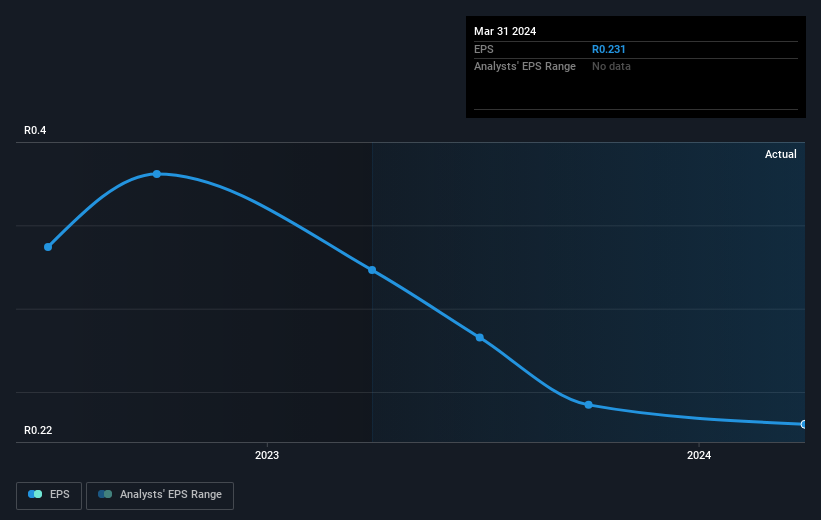- South Africa
- /
- Diversified Financial
- /
- JSE:DNB
Deneb Investments (JSE:DNB) jumps 14% this week, though earnings growth is still tracking behind five-year shareholder returns

Generally speaking the aim of active stock picking is to find companies that provide returns that are superior to the market average. Buying under-rated businesses is one path to excess returns. To wit, the Deneb Investments share price has climbed 37% in five years, easily topping the market return of 21% (ignoring dividends). On the other hand, the more recent gains haven't been so impressive, with shareholders gaining just 25%, including dividends.
Since the stock has added R136m to its market cap in the past week alone, let's see if underlying performance has been driving long-term returns.
See our latest analysis for Deneb Investments
To paraphrase Benjamin Graham: Over the short term the market is a voting machine, but over the long term it's a weighing machine. One way to examine how market sentiment has changed over time is to look at the interaction between a company's share price and its earnings per share (EPS).
During five years of share price growth, Deneb Investments achieved compound earnings per share (EPS) growth of 25% per year. This EPS growth is higher than the 6% average annual increase in the share price. Therefore, it seems the market has become relatively pessimistic about the company. This cautious sentiment is reflected in its (fairly low) P/E ratio of 10.65.
The company's earnings per share (over time) is depicted in the image below (click to see the exact numbers).

It might be well worthwhile taking a look at our free report on Deneb Investments' earnings, revenue and cash flow.
What About Dividends?
When looking at investment returns, it is important to consider the difference between total shareholder return (TSR) and share price return. The TSR incorporates the value of any spin-offs or discounted capital raisings, along with any dividends, based on the assumption that the dividends are reinvested. Arguably, the TSR gives a more comprehensive picture of the return generated by a stock. We note that for Deneb Investments the TSR over the last 5 years was 66%, which is better than the share price return mentioned above. And there's no prize for guessing that the dividend payments largely explain the divergence!
A Different Perspective
Deneb Investments provided a TSR of 25% over the last twelve months. Unfortunately this falls short of the market return. The silver lining is that the gain was actually better than the average annual return of 11% per year over five year. This suggests the company might be improving over time. It's always interesting to track share price performance over the longer term. But to understand Deneb Investments better, we need to consider many other factors. Even so, be aware that Deneb Investments is showing 3 warning signs in our investment analysis , you should know about...
Of course, you might find a fantastic investment by looking elsewhere. So take a peek at this free list of companies we expect will grow earnings.
Please note, the market returns quoted in this article reflect the market weighted average returns of stocks that currently trade on South African exchanges.
New: Manage All Your Stock Portfolios in One Place
We've created the ultimate portfolio companion for stock investors, and it's free.
• Connect an unlimited number of Portfolios and see your total in one currency
• Be alerted to new Warning Signs or Risks via email or mobile
• Track the Fair Value of your stocks
Have feedback on this article? Concerned about the content? Get in touch with us directly. Alternatively, email editorial-team (at) simplywallst.com.
This article by Simply Wall St is general in nature. We provide commentary based on historical data and analyst forecasts only using an unbiased methodology and our articles are not intended to be financial advice. It does not constitute a recommendation to buy or sell any stock, and does not take account of your objectives, or your financial situation. We aim to bring you long-term focused analysis driven by fundamental data. Note that our analysis may not factor in the latest price-sensitive company announcements or qualitative material. Simply Wall St has no position in any stocks mentioned.
About JSE:DNB
Deneb Investments
An investment company, distributes branded products in South Africa and internationally.
Proven track record with adequate balance sheet and pays a dividend.
Market Insights
Community Narratives



